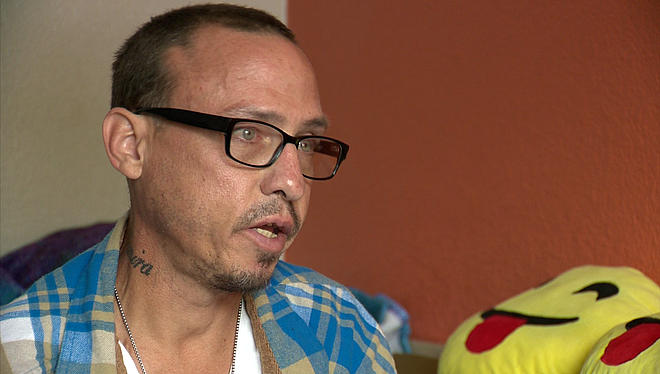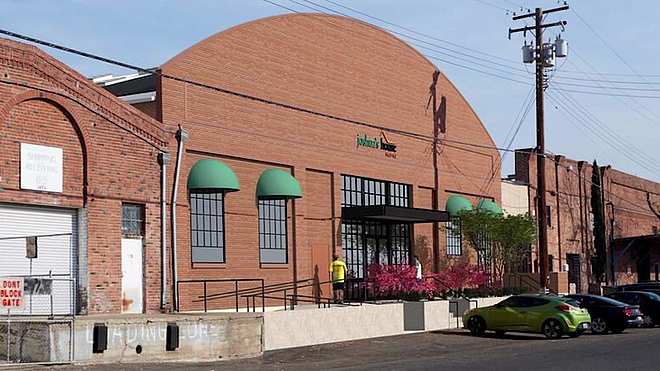Hope, Humanity & Housing: Terminally ill and living on Sacramento streets
Reporter Vicki Gonzalez spent the past year on this series as a recipient of the 2018 California Fellowship with USC Annenberg Center for Health Journalism.
Other stories in this series include:
Hope, Humanity & Housing: Life on Sacramento streets
Hope, Humanity & Housing: 69-year-old gets second chance after living on Sacramento streets
Hope, Humanity & Housing: Sacramento program aims to get people off streets, into homes
Hope, Humanity & Housing: Sacramento Mercy Pedalers deliver simple solutions

Jamie Murphy / KCRA 3
Pancreatic cancer took Jamie Murphy’s life on Aug. 14, 2018. But not without a leaving behind a legacy of empathy -- that the most vulnerable should die with dignity and respect.
The 46-year-old gave an emotional testimony during a Sacramento City Council meeting taking up Joshua’s House. In May, councilmembers voted unanimously for the homeless hospice center to move forward.
"These kinds of things show who we are as the heart and soul of this country and as a society,” founder Marlene von Friederichs-Fitzwater said. “And we need to take better care of people."
Murphy's terminal diagnosis ultimately left him unable to work, rotating from motel to motel. He lived off a little over $900 a month in supplemental security income.
His SSI covered roughly half the motel bills, leaving Murphy to scrounge for the rest. He said his local church would often help cover costs.
"(Motels) only allow you 14 days to stay," Murphy explained. "But, they've been allowing me 28 days."
Murphy lived with his fiancée for more than 11 years; a relationship that ultimately came to an end due to his debilitating condition.
"She saw me start to deteriorate, so she couldn't -- she was having a hard time,” Murphy said. “So, we parted ways. I didn't want to do that to her anymore."
Going through chemotherapy and with a vulnerable immune system, Murphy went searching for an affordable, sanitary solution. He called Joshua’s House, incorrectly thinking the homeless hospice facility was open.

Joshua’s House is scheduled to open in early 2019. The 20-bed facility is partnering with all Sacramento-based hospitals to provide hospice care to those terminally ill on the streets.
"I met newly diagnosed cancer patients who were homeless, and that was shocking to me,” Fitzwater said. “I had not thought about that -- that someone could be going through cancer and be homeless. And as a cancer survivor myself, I just, I couldn't understand how you go through that."
Fitzwater, a retired UC Davis Medical School professor, was propelled to spring into action when confronted with the issue personally.
"I lost my grandson in 2014 who died on the streets,” Fitzwater said. “He had been homeless much of his adult life due to addictions-- but he was this very loving compassionate wonderful young man."
Although Joshua’s House couldn’t yet help Murphy -- Fitzwater could. She stepped in financially, covering Murphy’s motel costs until she could find him a permanent home for his final month.
Fitzwater’s effort paid off. For the last month of Murphy’s life, he struck the housing lottery in the shape of a fifth wheel provided by Sacramento Self-Help Housing.
"When I am in heaven, I will put good words in for everybody and stuff," Murphy said. "Get them off the streets. Give them the same chance I'm getting. That's what I want for people."
As for Murphy, the 46-year-old was able to make amends with his family and longtime love before passing away.
Fitzwater said a portion of Murphy’s ashes will stay at Joshua’s House, as well as a memorial in honor of his legacy.
"Homeless people should have the opportunity to have hospice care and be cared for,” Fitzwater said. “To have a way to die with dignity and love as we do."
[This story was originally published by KCRA 3.]

